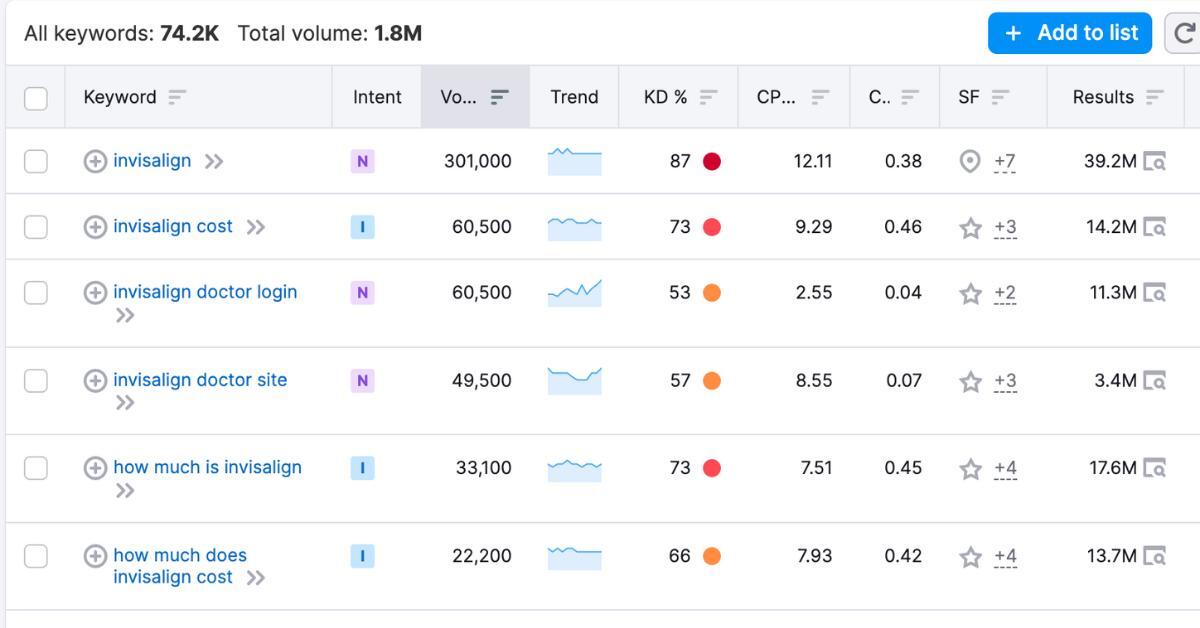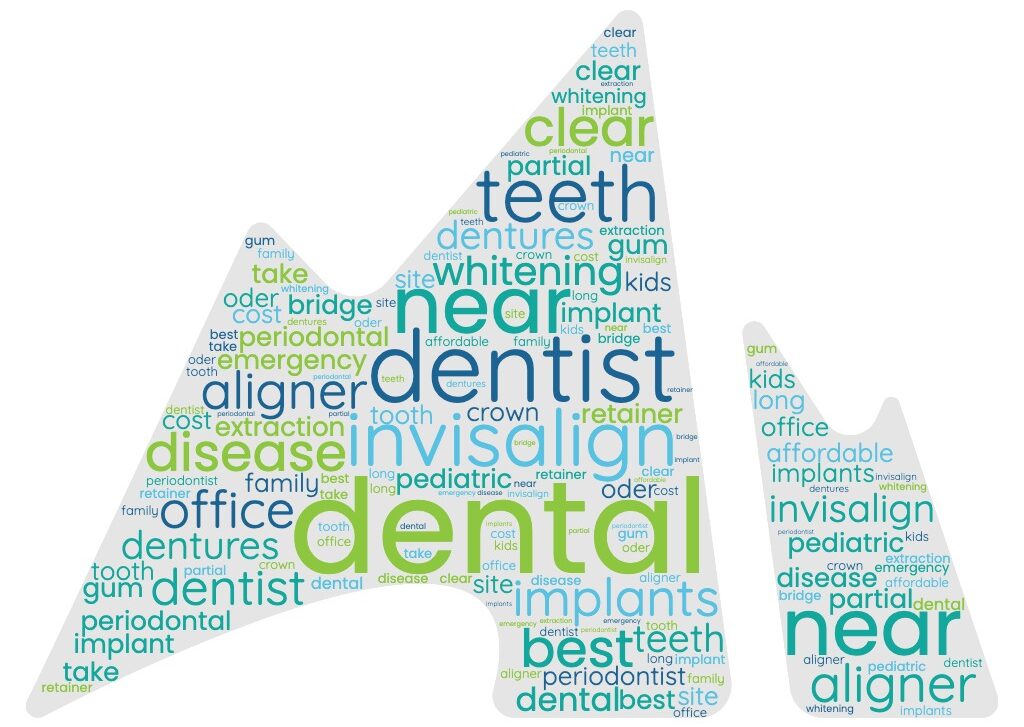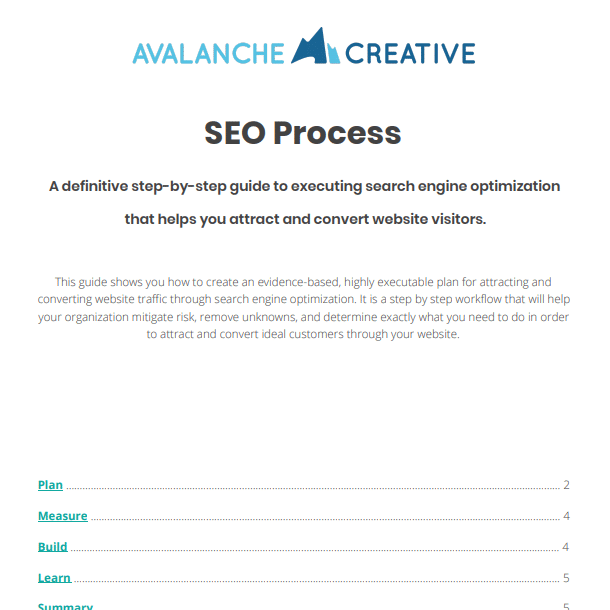Local SEO for Dentists: A Guide for Improving Rankings
Category: Healthcare, Industry Guide | Tags:
Table of Contents
What Is SEO for Dentists?
SEO is the process of making sure your dental practice shows up in search results when someone searches for dentists near them or for information about certain dental services. This is done by creating written content with keywords, or highly used search terms, by making sure your website runs smoothly and by getting other websites to mention yours.
Why are SEO services important for your dental business? It’s an effective way to get new patients and establish yourself as a trustworthy dentist. When a person moves to a new town, they’re probably going to turn to Google as a resource. They’ll want to find dentists near them and look at their reviews and website content to see if a place is a reliable practice.
SEO for dentists aims to bring high-quality leads, or people who are likely to become future patients, to a dental practice’s website. There are many different methods of dental SEO, from keyword-rich content to page speed optimization to technical audits. Let’s take a look at some of the SEO methods we recommend for dentists.
On-Page, Off-Page & Technical SEO
On-page SEO focuses on optimizing content within a website page to rank higher on search engines. This may include multiple forms of content, like blog posts, service pages, images, and videos. An example of on-page SEO for your dental practice would be a page that focuses on Invisalign®. You could include a video that talks about the product, which keeps people on the page for longer, which makes search engines see your content as valuable.
Off-page SEO consists of all other websites that link to your page, known as backlinks. Backlinks are a great way to build credibility in the dental industry and boost SEO relevance. Essentially, Google takes note when other websites link to yours, seeing it as evidence of your site’s value to searchers. This can be done by getting listed on dental directories, being quoted in articles, or having great information about dental procedures that can be cited by another website.
Technical SEO involves the “back end” of your website. The developer of your site needs to ensure that it is readable to search engines. Search engines like Google “crawl” and index pages to determine what dental website pages are relevant to various search queries.
Meta Titles and Descriptions
Meta titles are the page titles users see when your page appears as a search result. The content preview that appears below it is known as the description. Optimizing these to fit keywords improves your ranking in search engines and draws more potential patients to your practice.
An example of a good meta title for your practice would be “Dental Bridge Procedures in Grand Rapids, MI.” This contains great keywords people would search for and lets the user know exactly what your dental practice offers before even reading the content.
Keyword Research
Keyword research is an investigation of what your target audience is searching for. There are multiple tools available to aid in keyword research. Semrush is a popular option and is favored by many SEO agencies. It allows you to find keywords related to your topic, and it shows statistics including the monthly search volume. Keyword research should also involve an examination of your competitors’ keywords and rankings.
Good keywords in the dental industry typically focus on local SEO, a term we will cover later, and search queries that ask questions about different dental services, like veneers and root canals, as well as different health issues, like periodontal disease. Common search queries such as “How soon can I eat after a tooth extraction?” can be used as headers and answered in your content piece.
Page Load and Mobile Friendliness
Your page load speed is crucial not only to SEO but also to your potential dental patients. Google will promote sites with a faster page load speed, especially if it is fast on a mobile device.
Keep the size of your images minimal and work with an experienced web developer to optimize your site for speed. It’s important that images load quickly and show potential dental patients the beautiful teeth that quality dentistry can lead to. A person looking for dental work, especially emergency dental work, doesn’t want to wait for a slow site to load.
Web Design
Your dentistry website is important to the user’s experience. If your potential customer can’t easily find what they are looking for, you may miss out on new business. It’s important to consider internally linking between pages to add context and help the user navigate.
For instance, adding a link to your page about dental x-rays on a post discussing the necessity of dental crowns would provide relevant and useful information for readers. If they are reading about the cost of fillings, they may want to be directed to a page about the difference between amalgam and composite fillings. The more time a person spends reading on your website, the more search engines will like you!
Link Building
Link building is the process of acquiring backlinks, or links from other sites, to your website. This is really important to build your expertise, authoritativeness, and trust as a provider of dental services. When other websites reference your content, it is establishing you as an authority in the dental industry and letting patients know that they trust you to work on their smile, whether for cosmetic dental work or necessary fillings.
Local SEO
Local SEO helps you optimize your site for a local audience. People who are looking for a dentist want results that are nearby. If your target audience is close to your company’s location, it’s important to add local SEO.
A great way to do this is to create a page for each area your dental practice serves. You can attract local users to your page by ranking for keywords that contain local cities, such as “Grand Rapids dentists.” Another way to improve your local SEO is to reach out to local business directories or city chambers and get listed on their index of dental practices.
Creating a Google Business Profile account (formerly known as Google My Business) will also boost your local visibility. Dental practices that show up on a map with reviews and a website are more trustworthy to potential patients. They want to know they are going to an established dentistry.
An Example of How SEO for Dentists Works
Take a look at the search results for an example query, “Invisalign near me.” Below is a list of the search results when searched in Grand Rapids, Michigan. Notice the search algorithm pulls the word “Invisalign” from websites and reviews to bring users relevant content. It understands that someone searching for a product or service is likely looking for somewhere to buy it. Local SEO for dentists requires knowledge of user intent and the importance of mentioning services offered.

The Importance of Local SEO Dental Marketing
Educating your audience on a topic is a vital part of SEO marketing. When users see that you are highly knowledgeable in your field, they are more inclined to feel comfortable using your services or products. Local SEO for dentists specifically targets consumers within the company’s area and leads to a higher conversion rate. Patients in the area will come across your site and engage with your business. The average person isn’t very likely to drive more than an hour away for dental work. That’s why local SEO for dentists is a prime opportunity to attract new patients.
5 Tips & Strategies for Improving Your Local SEO
1. Create High-Quality Content Containing Relevant Keywords
The quality of your content is just as important as making sure it’s rich with keywords. Search engines favor content that is easy to access, read, and index. They pay attention to how long users spend on your site and the intent of the page’s copy. Content should be informative, avoid repetition, and flow smoothly.
In the dental industry, it’s important to create content that is written at a level that the average person understands. There are many great keywords, such as “dental resin cement,” but they need to be explained in simple terms to readers who are not familiar with the industry. Content needs to be as digestible for readers as it is for search engines.
2. Improve Website Page Speed & Mobile-Friendliness
Page loading speed is one of many factors that search engine algorithms take into account when determining relevant SERP results. Since a large majority of internet users are browsing on mobile devices, mobile optimization is a necessity. A user should be able to navigate the dental services you offer, find your office location, and see your availability with ease. Implementing a tool that allows them to make appointments online is also a major advantage.
3. Stay Active on Social Media Platforms
Inactive social media profiles reduce a dentist’s credibility. Your target audience wants to be updated on the latest news, such as new insurances you work with or deals on teeth whitening treatments.
Building a following on social media gives the impression that you are a dentist who is respected in the dental industry. Images are also a powerful selling tool. Show before and after photos of beautiful smiles on platforms like Instagram so your target audience can see the results of your work.
4. Utilize Google Business Profile & Other Local Listings
A presence on Google Business Profile and local listings shows reputability. It also means that when someone searches for dentists in your city, your business is more likely to appear as a result. A select handful of businesses appear on Google’s map feature with reviews, photos, and a link to their website when a user searches for certain services.
5. Conduct Competitive Analysis & Market Research
To rank above your competitors, you need to know their SEO strategies. Evaluate what they’re doing successfully and follow suit, and take advantage of the areas they’re falling short in. If your competitor doesn’t have content about how fluoride keeps teeth healthy, that presents itself as a prime opportunity for you to step in and create a high-ranking blog post.
The Best Dental Keywords & Phrases to Target
When planning strategies for local SEO for dentists, it’s important to have a list of several keywords. Including 5–10 keywords increases your chances of ranking for one of them. Because you want to appear in search results only for your target audience, avoid using keywords that pertain to services your business doesn’t offer.
Dentists are typically found on local searches, and keywords for dentistry tend to have a high volume. There are thousands of dentist websites throughout the country, which makes ranking more difficult. That’s why you need to be using local SEO dental strategies.
Short-Tail Keywords for Dentists
Short-tail keywords are search queries that are only a few words long. They tend to be more broad and generic in their intent. Here are just a few of our list of great short-tail targeted keywords for dentists, and you can localize these terms by adding your city:
- Family dentistry
- Children’s dental health
- Pediatric dentist
- Dentistry for children
- Dentist in [city]
- Restorative dentistry
- Dentist appointment
- Family dentist
- Kids dentist
- Affordable dentist
- Dentist clinic
- Dental bridge
- Dental office
- Dental filling
- Invisalign cost
- Invisalign vs braces
- Braces cost
- Pediatric orthodontist
- Adult braces
- Composite veneers
Long-Tail Keywords for Dentists
Long-tail keywords are phrases that are looking for something more specific. They are often worded as questions and are typically four words or longer. Here are some examples of good long-tail keywords for dentists to use:
- Emergency dentist near [city]
- Best dentist for kids
- Dentist that accepts Medicaid
- 24 hour emergency dentist
- Teeth whitening at dentist
- Dentist open on weekends
- Dental tooth whitening cost
- How much are dental implants
- Does Medicaid cover dental
- What is a dental bridge
- What is a dental crown
- Dental insurance that covers implants
- Soft foods to eat after dental surgery
- Prolonged numbness after dental work
- Financial assistance for dental work
Dental Websites that Increase Traffic & Conversions
We have experience in creating dental websites that are optimized for search engines. Our process is evidence-based and ROI-driven. Websites are a huge project, and they require constant maintenance. Your website needs to be up to date on what dental services you offer.
Delegating that to a member of your company takes away important time that could be spent performing routine cleanings or fillings. Outsourcing web development to an SEO agency assures your website will have quality, high-ranking content.
Evidence-Based Content Marketing & SEO Services for Dentists
Avalanche Creative carries out highly strategic and ever-evolving SEO content plans designed to bring your company results. We view localized SEO as a vital investment and have worked with a number of dental companies to improve their keyword rankings.
If you’re looking for more information on local SEO for dentists, chat with us today, or watch this 10-minute presentation on how to generate local leads through content and SEO for dentists.
Video Overview: SEO for Dentists
Watch this 10-minute presentation of how to generate local leads through content and SEO for dentists.
Frequently Asked Dental SEO Questions
How Much Does SEO Cost for Dentists?
This may vary depending on the size and profile of an agency. There are agencies that specialize in dentist SEO, and others that are familiar with the industry. Working with an agency that has prior dentist SEO experience gives you an advantage. The average cost ranges from $1,500 to $5,000 a month, depending on the type of work you want for your website and your budget.
How Long Does a Dental SEO Campaign Take to See Results?
As SEO is a long-term strategy, a dental SEO campaign can take up to six months to produce results. Some practices may see results even faster, depending on the work that needs to be done.
How Do You Know If Your Dental SEO Is Working?
A well-founded agency that cares about its clients should be sending you regular periodic reports on how your SEO strategy is performing. However, if you want to see if the revenue is worth the cost of your investment, you can calculate your rate of return.
What’s a Good Dental SEO Marketing Goal to Set?
Having pages that rank on the first page of Google is always a good goal to set. However, the way users interact with your site is most important. Good SEO marketing should result in new patients being drawn to your business.
Can I Do My Own Dental SEO?
You can, but you’ll achieve better results when you outsource SEO to professionals with years of experience.
Get the Keyword List
Fill out the form below and we’ll send you the list! Ready to invest in SEO and find the perfect keyword list for your dental practice? Chat with us today.
Share this article:
The Avalanche Email: Fun. Simple. Educational. No Selling.
Learn Result-focused SEO & Content
Join over 2,272+ others who get one email every Wednesday with simple instructions on how to get more website traffic and leads through SEO and content marketing. (Learn more about the email)
Keep Learning
Creating the Perfect SEO Content Template in Google Docs
Learn how to create an SEO Content Templates in Google Docs to help drive new traffic to your website from the search engines. SEO Content Templates provide specific recommendations and directives for creating new content on your website with the purpose of improving your SEO.
How To Show Up in Gemini (And Win More Local Jobs)
Show up in Gemini when homeowners search for landscaping services. Build the right signals on Google and your website to win more qualified local jobs.
How to Run Google Ads for Landscapers: A Complete Guide
Learn how to set up Google Ads for landscapers, attract qualified leads, and win more local jobs with this step-by-step guide.
🏔️ Watering > Planting New Seeds
Your next marketing win may already be on your site. Learn how to optimize existing pages for better rankings, traffic, and results.
The Recipe vs. The Meal
Your customers buy the experience, not the product. Discover a simple way to shift your message from ingredients to the full meal.
What’s the Best CMS for Landscaping Businesses?
Compare the best website platforms for landscapers. Learn the pros and cons of Wix, Squarespace, and WordPress, and why WordPress is best for long-term SEO.





